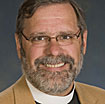Commentary on Psalm 25:1-9
The first lesson makes it clear that God will neither require children to pay for the sins of their parents nor allow them to rest satisfied in their parents’ goodness; rather, God will judge each person according to his or her own deeds: righteous or wicked.
Psalm 25 responds by voicing a prayer that might be on the lips of someone who has just been liberated from “family of origin theology” and seeks now to embrace God’s way for himself or herself. To those who have just heard the Ezekiel reading, verse 3, “Let none who look to you be put to shame; rather let those be put to shame who are treacherous,” especially will echo the theme of individual accountability.
The psalm is intimate and intensely personal, voiced in the first person singular and addressing God in the second person singular. And woven through this appointed portion of the psalm are four key themes: the psalmist’s total surrender to God and variations on three imperatives addressed to God: don’t let me be put to shame; show, teach, and lead me in your paths; and remember yourself and your character and forget me and mine.
The psalmist’s surrender is rendered most beautifully in the opening line, “To you, O LORD, I lift up my soul.” Allow yourself to contemplate this offering of the deepest, truest part of the self to God. The act of submission is touching in its profound vulnerability and simultaneously strong in its volition (foreshadowing Jesus’ insistence in John 18 that “No one takes [my life] from me, but I lay it down of my own accord.”).
This theme of surrender reappears in verse 2, “I put my trust in you …” and again in verse 5, “in you have I trusted all day long.” A sermon that enters the psalm through this self-offering could remind Christians that the “path” toward which God finally “leads” us is the way of the cross. It should not be lost on us that the self-offering of a “lifted up soul” is a first action on that way.
The first imperative “Let me not be put to shame …” sets the tone for verses 2 and 3 and reveals the sliver of human fear and doubt that restrains the psalmist’s trust. (Some commentators prefer to translate this phrase as “Let me not be disappointed …”) The psalm is the testimony of one strong in faith: “Yes, you are God; yes, I trust you; yes, I am as sure as I can be that your ways are right.”
And yet then comes, “but please, please don’t disappoint me; please let me be right about you!” Here with the psalmist we come face-to-face with all that’s at stake when we surrender ourselves in faith — even when that surrender is to the God whose gracious mercy we know so well. The shadow side of trust is the yearning for that trust to be vindicated. The wonderful circular paradox is that the imperative that issues from that sliver of doubt is addressed to the one we’ve already been empowered to trust.
The second imperative, “show me your ways … teach me your paths,” plays on the iconic metaphor of “life as journey.” We can infer that the psalmist believes that many paths are available and that confusion among them is inevitable — thus the need for instruction and guidance. The psalmist asks God to be present and directive about the proper way to go (verses 4, 7, and 9). If only Garmin had a setting option for God’s voice.
The third imperative, in two parts, dominates verses 7-9 calling on God to remember God’s character (which is compassionate, loving, steadfast, faithful, gracious, and upright) and not to remember the psalmist’s character (which is sinful). Thinking back to the relationship of Psalm 25 to the first lesson, I feel drawn to this imperative and especially to verse 7. Ezekiel’s word from God was that children are released from any accountability for the sins of their parents; here the psalmist pushes further and asks for release from the sins of his or her own former self! Even as a Christian who embraces confession and begins each new day remembering the forgiveness offered in my baptism, I find the psalmist’s request daring, fresh, and hopeful.
My lived experience is of being haunted by past stupid and sinful choices. I am fortunate that the only consequence I face is to be merely haunted by them (though that can be paralyzing enough). But if God is willing to obey the imperative and to remember everlasting divine compassion and love and not our former sins, then there is amazing good news. When I’m sitting in the congregation on September 25, I want to hear more about how God’s gracious character makes it possible — even necessary, even inevitable — for God to set free those whose burden is to face daily such material consequences of their “former sins” as incarceration, injury, loneliness/exile, disinheritance, or compromised health.

September 25, 2011